Advisory board
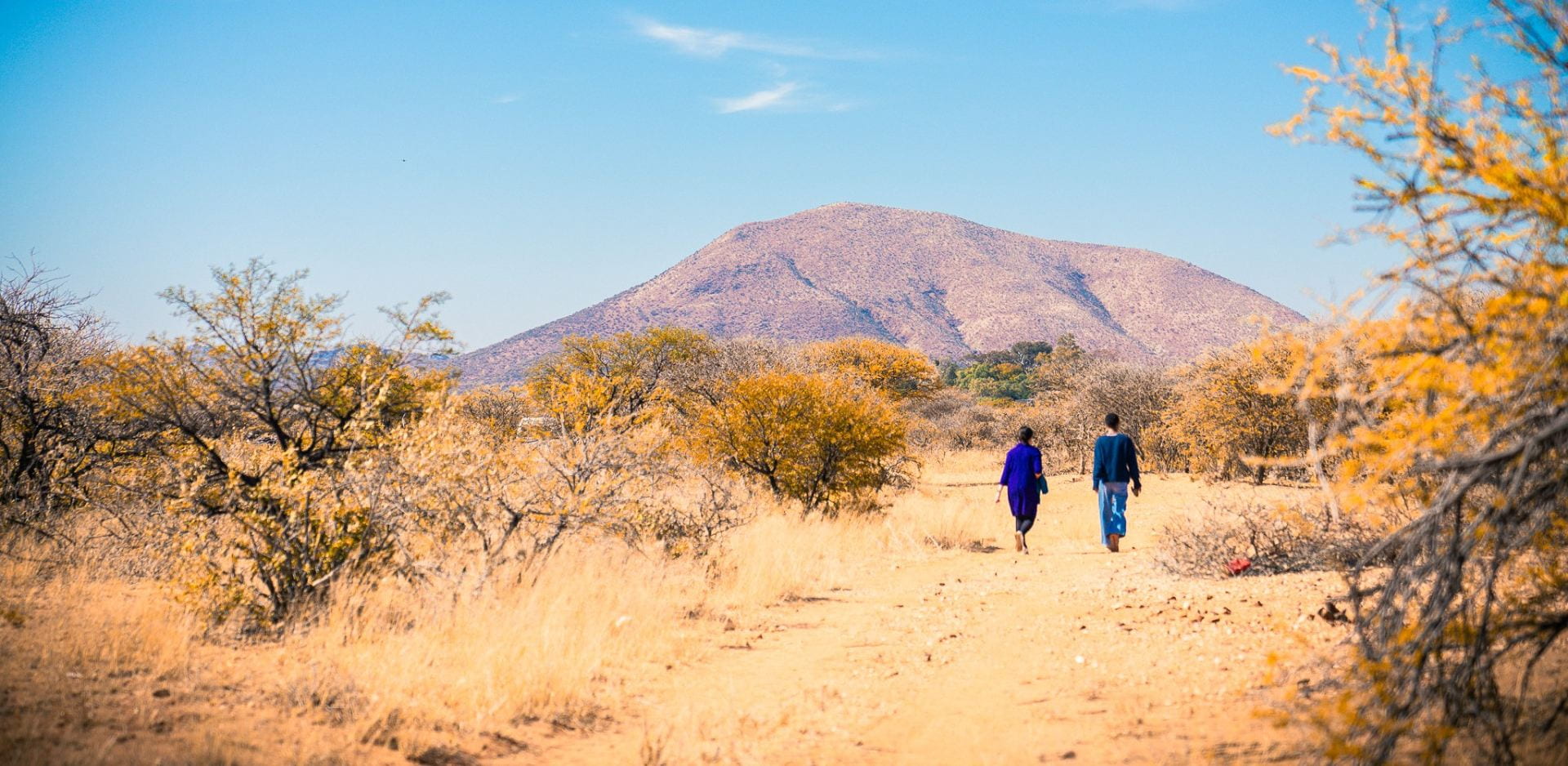
Advisory board role
PARC’s advisory board advises on, and helps to shape the Centre’s strategy.
Members
A majority of Board members are external to the University of Bristol, and from Africa and her diaspora, and represent a spectrum of experience and expertise.

Ms Joyce Achampong
Joyce is Executive Director and Group Practice Leader at Pivot Global Education. With extensive experience in the higher education sector including in Africa, she is an experienced project manager in both the education and not-for-profit sectors. A recognised thought leader, she has spoken at a number of international conferences as well as co-authored the chapter on Global innovation networks; the anatomy of change, (British Council’s Going Global 2015: Connecting cultures, forging futures).
Joyce has led the design, development and delivery of multi-dimensional cross-functional solutions to clients, bringing together strategy and university/community engagement. She has led her team in delivering project management and project evaluations as well as designing leadership and organisational development programmes.
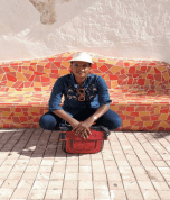
Ms Peninah Achieng-Kindberg
Peninah is an experienced Cipfa CCAB Accountant with 23 years’ experience working in various roles in public sector organisations, and a financial consultant with international experience. Her career has progressed within the Ministry of Justice over the last four years, from initially managing the finances of two correctional institutions based in the South of England, to providing strategic support for the implementation programme of the Prison Estate Transformation Programme.
Peninah is currently seconded to a Senior Policy Lead role, providing strategic direction to the Deputy Directors for the South of England and Youth Custody services within the Prison and Probation Service in England, in response to the Implementation of the Lammy review (2017).
Peninah’s passion for community activism and empowerment spans two decades. She currently supports various civic sector organisations including include the African Voices Forum, Health Watch, Bristol 2015, Bristol Link with Beira, Glenside Hospital Museum and the Prince’s Trust. She has received several awards in recognition for her work within the local community of the city of Bristol, being nominated for the top 100 inspirational women in the West region, and the top 100 BME Powerlist published in Bristol (2019).
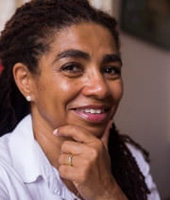
Professor Akosua Adomako-Ampofo
Akosua is Professor of African and Gender Studies at the Institute of African Studies, University of Ghana (UG). In 2005 she became the foundation Director of the University of Ghana’s Centre for Gender Studies and Advocacy, and from 2010-2015 she was the Director of the Institute of African Studies. She is President of the African Studies Association of Africa; an honorary Professor at the Centre for African Studies at the University of Birmingham; and a Fellow of the Ghana Academy of Arts and Sciences.
She is the immediate past Dean of International Programmes at the University of Ghana. Adomako Ampofo considers herself an activist scholar, and at the heart of her work are questions of identity and power—within families, institutions, political and religious spaces, and the knowledge industry. Her areas of interest include include African Knowledge systems; Higher education; Race and Identity Politics; Gender relations; Masculinities; and Popular Culture.
Akosua is Editor-in-Chief, Contemporary Journal of African Studies and Co-Editor of the blog Critical Investigations into Humanitarianism in Africa. She is on the board of several organisations including the U.S African Studies Association; The Centre for the Advancement of Scholarship, University of Pretoria, and Chairperson of a Ghanaian youth-led organization, ExLA, who have successfully hosted three Young African Women Congresses.
She is a member of The Council for the Development of Social Science Research in Africa (CODESRIA); the Network for Women’s Rights in Ghana (NETRIGHT), and the Ghana Domestic Violence Coalition. Adomako Ampofo’s work has been variously recognized; She has been a Junior Fulbright Scholar; a New Century Fulbright Scholar and a Senior Fulbright Scholar-in-Residence.
Akosua has been a Fellow at the Rockefeller Foundation’s Bellagio centre. In 2010 she was 2 awarded the Feminist Activism Award by Sociologists for Women and Society (SWS); in 2014 she was a Mellon Fellow at the Centre for African Studies at the University of Cape Town; in 2015, she was the African Studies Association (of America’s) African Studies Review Distinguished lecturer; and in 2019 she delivered the Audrey Richards Distinguished Public Lecture at the Centre for African Studies at the University of Cambridge.
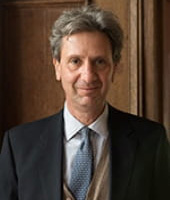
Mr James Alexandroff
James studied law at the University of Bristol (1976 to 1979) before going on to become a solicitor with Clifford Chance in London. He became a fund manager with Stewart Ivory in Edinburgh in 1987 focusing on Emerging Markets and went on to join Indosuez Asset management and then GT Asset Management in Hong Kong from 1990 to 1997; after which he co-founded an Emerging Market Investment boutique, Arisaig Partners, in Singapore.
He settled his ownership into a Trust in 2000, the Perivoli Trust, Having passed on responsibility for Arisaig Partners to a younger generation of employees, James now advises the Trustees of the Perivoli Trust on its investments and philanthropic activities. A particular focus is a portfolio of early stage venture investments spinning out of UK Universities and opportunities in Africa: Perivoli Innovations, which itself seeks to fund the work of the Perivoli Schools Trust across several countries in Sub-Sahara Africa as well as the Perivoli Foundation, a UK Charity, and the Perivoli Africa Research Centre. He is married and lives in Somerset with four children and other animals.
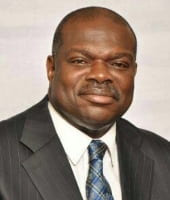
Professor Ernest Aryeetey
Ernest is the foundation Secretary-General of the African Research Universities Alliance (ARUA), a network of 16 of Africa’s flagship universities. He is a Professor of Economics and former Vice Chancellor of University of Ghana (2010-2016). He was also previously Director of the Institute of Statistical, Social and Economic Research (ISSER) at University of Ghana and the first Director of the Africa Growth Initiative of Brookings Institution, Washington D.C.
Ernest has held academic appointments at the School of Oriental and African Studies (London), Yale University and Swarthmore College in the U.S. at various points in time. He was a member of the Governing Council of the United Nations University (May 2016 – May 2019), and was previously Chairman of the Governing Board of UNU-World Institute for Development Economics Research (Helsinki).
Until September 2020 Ernest was also a member of the Governing Board of the Centre for Development Research at University of Bonn. He served as Resource Person and member of the Programme Committee of the African Economic Research Consortium (Nairobi) for many years. He is currently Board Chair of Stanbic Bank Ghana Limited.
Ernest’s research focuses on the economics of development with interest in institutions and their role in development, regional integration, economic reforms, financial systems in support of development and small enterprise development. One of is his strategic priorities as Vice Chancellor at University of Ghana was to develop the University into a research-intensive institution that supports structural transformation in Ghana and in Africa. He led his colleagues to engage in building many new research and graduate programmes that aim to both advance knowledge and to promote national development.
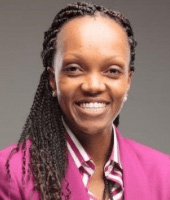
Dr Evelyn Gitau
Evelyn is Director of Research Capacity Strengthening at the Africa Population and Health Research Centre (APHRC) and serves on the advisory boards of numerous organisations working to advance research and evidence generation in Africa.
These include the Independent Scientific Advisory Board (ISAB), Malawi-Liverpool-Wellcome Trust Clinical Research Programme College of Medicine, the University of Oxford (MSc International Health and Tropical Medicine) and the Investment Committee Grand Challenges Canada. She will remain a member of the Steering Committee for Grand Challenges Africa.
Evelyn’s prior roles include Program Manager the African Academy of Sciences (AAS), where she stewarded the Grand Challenges Africa at the Academy under the Alliance for Accelerating Excellence in Science in Africa (AESA) program, whilst her awards and accomplishments include a 2015 appointment as a fellow of the Next Einstein Forum, where she is the ambassador for the development of Science, Technology, Engineering and Mathematics in Africa.
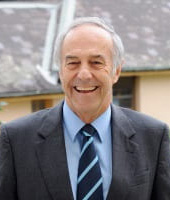
Professor John Hearn
John is a Professor of Reproductive Physiology in the School of Medical Sciences at the University of Sydney. He was awarded his PhD from the Australian National University (ANU) and served for 6-7 years each in leading research, teaching and administrative positions at the Universities of Edinburgh, London UCL, Wisconsin, ANU and Sydney. Most recently he was Vice President (Research) at ANU 2000-4, and Vice President (Academic and International) at Sydney 2004-13.
A graduate of the Australian Institute of Company Directors, Professor Hearn has published 210 research papers and edited six books in reproduction and fertility, stem cell biology and biotechnology. A committed international citizen, he has worked globally in research capacity development, especially in China, India, Thailand, Kenya and Brazil.
John is Chair of the Australian Africa Universities Network (AAUN), and a senior adviser to the Australian Government, World Health Organisation and the OECD. He was (to 2013) a Board member of the Australian Nuclear Science and Technology Organisation, and Chairman of the Board of the Sydney Confucius Institute.
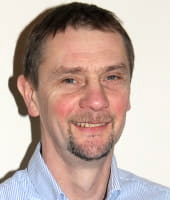
Professor Guy Howard
Guy is a Professor of Environmental and Infrastructure Resilience in the School of Civil, Aerospace and Mechanical Engineering at the University of Bristol.
He has extensive experience in policy, research and implementation in low and middle income countries, spending over 15 years at the Department for International Development (DFID). Guy’s research focuses on water and sanitation services, climate change and resilience, environmental change and public health engineering.
Guy is the Global Challenges Research Chair in Environmental and Infrastructure Resilience at the University of Bristol and will provide crucial insight and expertise at all levels, including the development and realisation of Capstone Three.
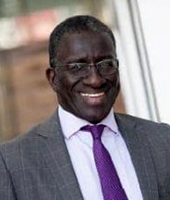
Mr Sola Mahoney
Sola is the Non-Executive Chairman of Guaranty Trust Bank, Gambia and the Chairman of the Board of GigaGas Ltd. in Nigeria. He also chairs the Board of Trustees of HelpAge International (Kenya) and sits on the global board of HelpAge International, where he is Chair of the Governance Committee.
Graduating from Harvard University (BSc Sociology), and with an MSc in International Affairs from Columbia University, New York, he has over twenty years’ banking experience, most of it gained from his time working in international banking with Citibank, Standard Bank and Barclays.
Having worked for several years in the Gambia’s civil service in the areas of economic policy management and aid coordination, Sola also has considerable insight into the inner workings of the African public sector. More recently, he has been involved in several management consultant assignments focused on the Gambia’s public sector.
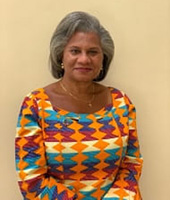
Dr Julitta Onabanjo
Dr. Julitta Onabanjo is the United Nations Population Fund (UNFPA) Regional Director for East and Southern Africa. Having joined UNFPA in 1995 as a National Programme Officer, she has over two decades of insight and wisdom on matters pertaining to the sexual reproductive health and rights and empowerment of women and young people throughout Africa.
Julitta worked in the field as a Programme Specialist in Swaziland and Kenya, and went on to serve at UNFPA Headquarters as Technical Advisor, and later as Special Assistant to the Executive Director. More recently, she has held UNFPA Representative posts in Tanzania and South Africa.
Before joining UNFPA, she worked for Planned Parenthood as Programme Director and prior to this, she worked for the Ministry of Health in Nigeria.
Julitta holds a Bachelor’s Degree in biology from the University of London and a Medical Doctor degree from the University of Zambia, in addition to a Master’s Degree in Public Health from the London School of Hygiene and Tropical Medicine.
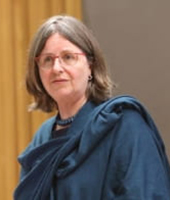
Professor Susan Parnell
Susan is Global Challenges Professor of Human Geography, School of Geographical Sciences at the University of Bristol and Emeritus Professor at the University of Cape Town, where she was the co-founder of the African Centre for Cities.
She has recently been a Visiting Professor at LSE Cities, a Leverhulme Visiting Professor at UCL and the Emeka Anyaoku Visiting Chair University College London.
Susan has been actively involved in local, national and global urban policy debates around the United Nation’s 2030 Sustainable Development Goals (SDGs), and is an advocate for the enhancement of science policy engagement in urban environments.
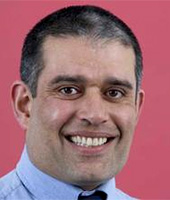
Professor Leon Tikly
Leon is UNESCO Chair in Inclusive, Good Quality Education and Global Chair in Education at the University of Bristol, alongside co-directing the Centre for International and Comparative Education (CIRE) in the School of Education.
His key focus is education in low income countries,in particular insub-Saharan Africa. He is currently principal investigator on a Global Challenges Research Fund (GCRF) Network Plus project entitled Transforming Education for Sustainable Futures (TESF), having previously directed projects on language supportive textbooks and pedagogy in Rwanda, and a DfID funded Research Programme Consortium (RPC) on implementing education quality in low income countries. For more information see EdQual. Read synthesis report (PDF, 836kB)
Whilst much of Leon’s empirical work has a practical focus, his work is underpinned by theoretical questions. These include how to conceptualise education for sustainable development as an aspect of the ‘postcolonial condition’, the impact of globalisation on the low income world, and how to understand the relationship between education quality, inequality and social justice.
Leon’s 2020 book: Education for Sustainable Development in the Postcolonial World: Towards a Transformative Agenda for Africa, seeks to bring together these theoretical concerns. In 2023 he was appointed International Ambassador for the City of Bristol.
